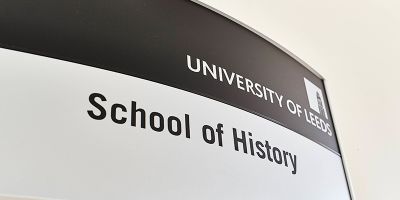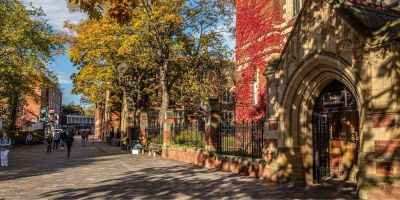Obituary: Professor Ernst Wangermann
Colleagues will be sorry to hear of the death on 26 November 2021 of Professor Ernst Wangermann.
Professor Ernst Wangermann was a member of the School of History from 1962, first as Lecturer in Modern History, then as Senior Lecturer (1970-77), and finally as Reader, before he left Leeds in 1984 to take up a Professorship in Salzburg University in his native Austria. This tribute has been written by his friend and colleague Dr John Schwarzmantel.
Ernst Wangermann was born in Vienna in 1925, where his early years were spent. Faced with the discrimination practised against those Austrians with even part-Jewish elements in their family ancestry following the Anschluss or annexation of Austria by the Nazis, Ernst’s mother decided that the family should leave. Ernst came to England with his sister in 1939 on one of the Kindertransporte which took so many Jewish children out of Nazi Germany and Austria. His first years in England were spent in Manchester, supported by the Quaker community which assisted many refugees. Ernst then obtained a scholarship to study history at Balliol College, Oxford. After his undergraduate course of study, where he was inspired by, among others, the eminent Marxist historian Christopher Hill, he continued to study for a DPhil. His DPhil research on the Austrian Jacobins began a life-long focus on Austrian history, especially on the enlightened Absolutism of the Emperor Joseph II. Ernst’s scholarship in this area gained him an international reputation as one of the leading scholars in the field of 18th century Austrian history. In Leeds his teaching was mainly concerned with European social and intellectual history in the period between the French Revolution of 1789 and the Russian Revolution of 1917. Alongside this teaching he continued with his research on Austrian history, resulting in several major publications, and requiring frequent research trips to Austria to work in the archives.
Despite having had to leave as a child, Ernst never lost his attachment to Austria, its history, to the German language, and to the music and culture of his native country. This love of Austria was not a purely academic or historical matter. He was a keen Alpine walker and explorer of the mountains, enjoying the overnight stays in the mountain huts which offer refuge, and hearty food and drink, to walkers.
In Leeds he had the great good fortune to make the acquaintance of Maria Josefa Fernández, a lectora in the Spanish Department, and their marriage in 1966 laid the foundation for a very happy family life with their two children, Pablo and Michael. Friends and colleagues lucky enough to be invited to their home would enjoy warm hospitality and Maria’s delicious cooking, and could appreciate lively conversation on politics, music and the mingling of Spanish, Austrian and British cultures.
Ernst’s intellectual approach and general Weltanschauung were those of a genuine follower of the European Enlightenment in politics and culture. He never lost his belief in the potentiality of human reason and political action to create a better more humane world. In his time at Leeds he was for many years the main organiser of the Left Lunch Club (subsequently renamed Left Lunch Forum). This was a discussion group, open to all colleagues, whatever their personal political perspective. It met on Wednesdays for an hour’s discussion on political and social topics of current interest, introduced with a brief talk by a colleague with special interest or knowledge of the topic under discussion. The aim of the Left Lunch Forum was to raise the level of political awareness in the university community, and Ernst did much to foster the general tone of lively and open discussion on issues of the day, avoiding any dogmatic or sectarian expressions of intolerance. While always a man of the Left, he was one of the most tolerant and open-minded contributors to political discussion, with a wide interest in current affairs in all parts of the globe.
Given his enduring love of Austria and his continuing scholarly concern with Austrian history, particularly focused on the Austrian Enlightenment and its successes and failures, it was a source of deep personal satisfaction and recognition of academic distinction when he was offered and accepted a Professorship of Modern History at Salzburg University. He was thus able to return to the country which he had had to leave as a child. He thoroughly enjoyed not just the academic opportunities facilitated by this new post but the easier access to his beloved mountains and the Austrian countryside a few minutes’ walk from his new home. He enjoyed the company of his new colleagues, and was much appreciated by the students, both undergraduate and postgraduate, whom he taught in Salzburg. They benefited from the personal attention and more informal interaction which Ernst, used to the British style of university education, brought to them. With the indispensable help of Maria, Ernst was able to set up a new home in Salzburg, and in his return to Austria he gained the recognition due to him as an outstanding scholar who, with so many others, had been forced out of his native country because of fascism and intolerance.
He will be much missed by friends and colleagues, both in England and in Austria, as an inspiring teacher and researcher, a man of wide erudition, great humanity and warmth, and as a loving husband and father.




